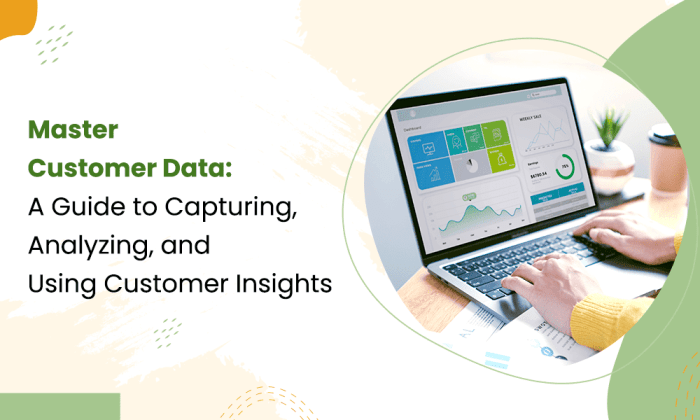Using Customer Data in Marketing sets the stage for innovative strategies and personalized campaigns that resonate with customers on a deeper level. Dive into the world of customer data and discover its transformative power in shaping successful marketing endeavors.
Importance of Customer Data in Marketing: Using Customer Data In Marketing
Customer data is a crucial tool for businesses looking to enhance their marketing strategies. By analyzing information about their customers, companies can make more informed decisions and create more targeted and effective campaigns.
Enhancing Marketing Strategies
Customer data allows companies to gain valuable insights into their target audience’s preferences, behaviors, and demographics. This information can help businesses tailor their marketing efforts to better meet the needs and interests of their customers. For example, by analyzing purchase history data, a company can identify trends and patterns that can inform future product development or promotional strategies.
- Customer data can help businesses identify high-value customers and tailor specific offers or promotions to retain their loyalty.
- Personalized recommendations based on past purchase behavior can increase customer engagement and drive sales.
- Segmenting customers based on demographic data can help companies create targeted marketing campaigns that resonate with different audience groups.
Successful Use of Customer Data
Many companies have successfully leveraged customer data to improve their marketing efforts. For instance, Amazon uses customer browsing and purchase history to recommend products to users, leading to increased sales and customer satisfaction. Similarly, Netflix analyzes viewing habits to suggest personalized content to subscribers, enhancing the user experience and reducing churn rates.
Customer data is the key to delivering personalized marketing messages that resonate with individual customers, driving engagement and loyalty.
Personalizing Marketing Messages
Personalization is a growing trend in marketing, and customer data plays a crucial role in making this possible. By collecting and analyzing data such as browsing history, purchase behavior, and demographic information, companies can create customized marketing messages that speak directly to the individual preferences of their customers. This level of personalization can lead to higher conversion rates, increased customer satisfaction, and long-term brand loyalty.
Types of Customer Data Used in Marketing
In marketing efforts, various types of customer data are utilized to create targeted campaigns and personalized experiences for customers.
Demographic Data
Demographic data includes information such as age, gender, income, education level, and location. This type of data is crucial in targeted marketing as it helps businesses understand the characteristics of their customer base. By analyzing demographic data, companies can tailor their marketing strategies to specific groups of people, ensuring that their messages resonate with the target audience.
Behavioral Data
Behavioral data refers to the actions and interactions of customers with a company’s products or services. This data can include purchase history, browsing behavior, and engagement with marketing campaigns. Understanding behavioral data is essential in gaining insights into customer preferences, interests, and buying patterns. By analyzing this data, businesses can create personalized marketing messages and offers that are more likely to resonate with individual customers.
Methods of Collecting Customer Data

In today’s digital age, companies have access to a plethora of methods for collecting customer data to enhance their marketing strategies and improve customer experience.
Online Data Collection Strategies
- Website Analytics: Companies use tools like Google Analytics to track website visitors, their behavior, and preferences.
- Social Media Monitoring: Monitoring social media platforms for mentions, comments, and interactions provides valuable insights into customer sentiment.
- Online Surveys and Forms: Creating online surveys and forms helps gather specific information directly from customers.
Offline Data Collection Strategies, Using Customer Data in Marketing
- In-store Purchases: Retailers can track customer purchases in physical stores through loyalty programs or point-of-sale systems.
- Feedback Forms: Collecting feedback through paper forms or comment cards in-store can provide valuable insights into customer satisfaction.
- Events and Conferences: Companies can gather customer data by hosting events or attending conferences to interact with customers face-to-face.
Best Practices for Data Privacy and Compliance
- Transparency: Clearly communicate to customers how their data will be used and ensure their consent before collecting any information.
- Security Measures: Implement robust security measures to protect customer data from unauthorized access or breaches.
- Compliance with Regulations: Adhere to data privacy regulations like GDPR or CCPA to ensure legal compliance and build trust with customers.
Utilizing Customer Data for Segmentation and Targeting

In the world of marketing, utilizing customer data for segmentation and targeting is crucial for creating personalized and effective campaigns that resonate with specific audiences. By analyzing customer data, companies can identify different segments within their customer base and tailor their marketing strategies accordingly.
Segmenting Target Audiences
- Segmentation based on demographics: Companies can categorize customers based on age, gender, income level, or location to create targeted campaigns for each group.
- Behavioral segmentation: Understanding customer behavior such as purchase history, browsing patterns, and interactions with the brand can help in creating customized marketing messages.
- Psychographic segmentation: By considering customers’ lifestyle, interests, and values, companies can target specific segments with relevant content.
Examples of Successful Targeted Marketing Campaigns
- A clothing brand sending personalized recommendations based on past purchases and browsing history, resulting in increased sales and customer satisfaction.
- A food delivery service targeting busy professionals with time-sensitive promotions, leading to a boost in orders during peak hours.
- An e-commerce platform segmenting customers by their preferred product categories and sending targeted emails with related deals, resulting in improved engagement and conversion rates.
Benefits of Personalized Marketing Messages
- Increased customer engagement: Personalized messages resonate more with customers, leading to higher open rates and click-through rates.
- Improved conversion rates: Targeting specific customer segments with relevant offers increases the likelihood of conversion and repeat purchases.
- Enhanced brand loyalty: By showing customers that their preferences are valued, personalized marketing messages can strengthen brand loyalty and long-term relationships.
Customer Data Analysis for Marketing Insights
Customer data analysis is a crucial step in gaining valuable insights to enhance marketing strategies. By carefully analyzing the data collected from customers, businesses can make informed decisions to improve their marketing efforts and drive better results.
Process of Analyzing Customer Data
- Identify key metrics: Determine which data points are most relevant to your marketing goals.
- Clean and organize data: Ensure that the data is accurate and free from errors before analysis.
- Analyze trends: Look for patterns and trends in the data that can provide valuable insights.
- Segment customers: Divide customers into groups based on behavior, demographics, or preferences.
- Draw conclusions: Use the analyzed data to draw conclusions and make data-driven decisions.
Examples of Data Analysis in Marketing
- Netflix analyzes viewing data to recommend personalized content to users, increasing engagement and retention.
- Amazon uses purchase history data to suggest products to customers, leading to higher sales and customer satisfaction.
- Google analyzes search data to deliver targeted ads to users, improving ad relevance and click-through rates.
Importance of Interpreting Data Accurately
- Accurate data interpretation ensures that marketing decisions are based on reliable information, leading to better outcomes.
- Misinterpreting data can result in misguided strategies and wasted resources, highlighting the importance of accurate analysis.
- By interpreting data accurately, businesses can identify trends, preferences, and opportunities to tailor their marketing efforts effectively.
